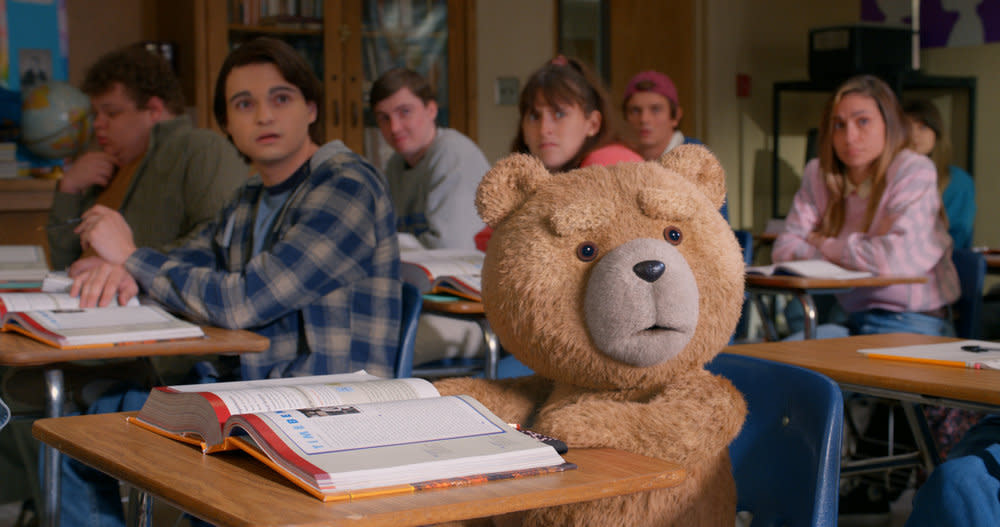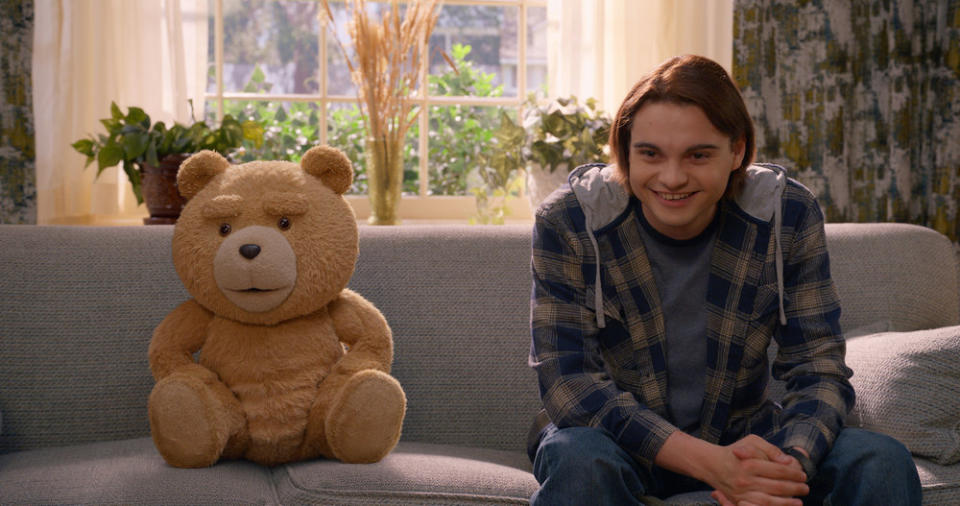The ‘Ted’ TV Show Stretches Seth MacFarlane’s Shtick to Its Limits

- Oops!Something went wrong.Please try again later.
- Oops!Something went wrong.Please try again later.
- Oops!Something went wrong.Please try again later.
“In 1985, Ted was an instant worldwide phenomenon,” Ian McKellen says, as voiceover for the opening moments of “Ted” the series. “But now it’s 1993 and, like every phenomenon, eventually nobody gives a shit.”
The button, flawlessly emphasized by the opening credits’ peppy melody, works better as a meta confession than a framing device (and I do believe it’s meant to be both). Peacock’s prequel series is not about Seth MacFarlane’s talking teddy bear on a quest for fame, purpose, or, well, much of anything really. Instead, McKellen — who replaces his “X-Men” bestie Patrick Stewart as “Ted’s” narrator — is merely acknowledging Ted’s fading relevancy (and thus “Ted’s” fading relevancy) while providing a mea culpa for what’s about to happen. Rather than attempt to revive a hugely profitable franchise, “Ted” the series is an apathetic regression — a functional yet wholly uninspired continuation that can’t even motivate this critic to revisit the 2012 film (which, mistaken or not, I remember liking).
More from IndieWire
'Oppenheimer' and 'Poor Things' Among 2024 American Society of Cinematographers Nominations
'Curb Your Enthusiasm' Season 12 Trailer: Larry David Returns for One Last Round of Petty Grievances
It’s as if the show itself has come not to praise Ted, but to bury him.
Ted” would be easily dismissed outright for its narrow obsession with boyish vulgarities, if not for the original film’s easily accepted premise. At eight years old, a lonely child wishes his teddy bear would spring to life and become his best friend. With a little help from a shooting star, his wish comes true, and the boy goes on to have so much fun, he never really grows up. Thirty years later, Ted (voiced by Seth MacFarlane), an icon of youthful adolescence, might be the handcuffs ensuring John’s (Mark Wahlberg) arrested development, but as long as they’re having a good time, why should he bother breaking free?
That question was central to MacFarlane’s debut movie, a massive hit that grossed more than half-a-billion dollars. No one seemed to mind that its awkward resolution suggested minimal gestures toward personal growth are all that’s needed to fulfill your adult responsibilities — I mean, some did, but most viewers seemed happy just to be reliving their carefree youth via a fantasy they didn’t know they wanted (smoking pot with their imaginary friend). The movie and the message worked in tandem: Shut your brain off, act like a kid again, and have a good time.
But after 12 years, a best-forgotten sequel (it starts with Ted and John breaking into Tom Brady’s house to steal his sperm), and far too many foul-mouthed comedies featuring emotionally immature man-babies, “Ted” hits a little different. Sure, its core conceit still invokes an adolescent mindset, which fits right in with modern entertainment’s nostalgia obsession. But the concept isn’t novel anymore, and one would hope those hordes of former ticket-buyers grew up just a little in the 11 years since. (Wahlberg may have, too, considering he decided he’d rather court Christians than make another talking bear movie — that, or Universal executives may have balked at green-lighting an R-rated sequel in today’s comedy-starved theatrical climate.)
So here we are. “Ted,” the TV series. Peacock’s prequel takes us back to when John was 16 years old (now played by the 26-year-old Max Burkholder), Ted was eight, and neither should feel bad about acting like idiots. Their age dissolves the film’s tension, making the show’s challenge how to depict John honestly: If he was acting like a teenager at 35, then what’s he supposed to act like as an actual teen? What’s his arc? How much can he learn and grow when he’s bound by logic to stay exactly the same until he turns into Mark Wahlberg again?

MacFarlane — who voices Ted, directs every episode, writes, and serves as co-showrunner — largely dodges the question by plugging his characters into a rote coming-of-age sitcom. Episodes are built around archetypal plots like school bullies, first dates, and, of course, getting high. It’s a genre designed for longevity, so John’s incremental change isn’t an issue, and Ted can serve as the comic relief within a screwball family where politically incorrect tirades from the cantankerous dad, Matty (Scott Grimes), are quelled by John’s nagging cousin Blair (Giorgia Whigham), and dutifully reconciled by a doting mother, Susan (Alanna Ubach).
But most of the jokes aren’t really jokes. They’re “shocking” or “offensive” opinions that are then flagged by “the P.C. thought police” (a phrase I don’t think existed in 1993) before the family moves on to the next outlandish remark. Matty will say something like he knows who rear-ended his car because it was parked outside “the Hong Kong buffet,” Blair will explain why he’s wrong to make assumptions based on racial stereotypes, and the scene will wrap up with someone making fun of her for some random reason. Because Marty is called out for being “a raging fucking racist,” it’s OK to laugh at his ignorance — never mind that he just keeps making the same “jokes” over and over, while being framed as a warm-hearted moron (and Blair the over-opinionated wet blanket). Eventually, John and Ted saunter off to get stoned and dissect the origins of “The Monster Mash,” or concoct ornate fantasies about the local video store’s porn section, and that’s the show.
Sound familiar? It should. “Ted’s” seven episodes are ripped straight from the “Family Guy” playbook. While the fluffy bear’s feather-light animation and a few actors’ charming efforts provide fleeting sparks of fun — I actually love Ubach’s performance, who works her Bahston accent into a weird cadence befitting Susan’s inner oddball, while delivering hilarious reaction after hilarious reaction, often with just a look — “Ted” isn’t trying to offer anything new or surprising. To its credit, it is trying to be funny, but its humor relies on viewers being shocked that such crude things could be said within the confines of a traditional sitcom — as if everything from “The Simpsons” to “Family Guy,” “It’s Always Sunny” to “Arrested Development” never happened — even more than it needs them to delight in all those F-bombs springing from a children’s toy.
Every so often, one of MacFarlane’s extended runners will click, or Ted’s sheer enthusiasm for a stupid idea proves infectious. But any chuckles brought out by the series feel like the kind of comedy you come up with out of sheer boredom; the chance aside during a long car ride that gets a laugh because your navigator is as mentally checked out as you are. That feeling can be difficult to capture in a scripted sitcom, but sporadic, cross-your-fingers-and-pray gags that either land with a soft titter or a loud groan aren’t enough to sustain an entire show.
I’m not sure why “Ted” is seven episodes long, instead of six, eight, or 12. I’m not sure why each of the first five episodes is shorter than the last, dropping from 51 minutes to 33, before ballooning back up to the low 40s for its final two entries. I’m not sure why this part of Ted’s (or John’s) story needed to be told, aside from Peacock needing programming and MacFarlane needing to produce something bigger than “The Orville” to justify his $200 million overall deal at Universal.
But I am pretty sure that any life wished into Ted a decade ago is all but gone now. And no one seems to give a shit.
Grade: C-
“Ted” premieres Thursday, January 11 on Peacock. All seven episodes will be released at once.
Best of IndieWire
Sign up for Indiewire's Newsletter. For the latest news, follow us on Facebook, Twitter, and Instagram.

